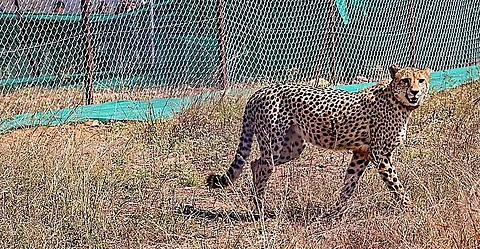
- Home
- Live Blog
- Breaking News
- Top Headlines
- Cities
- NE News
- Sentinel Media
- Sports
- Education
- Jobs

BHOPAL: Following a violent episode with male cheetahs during mating, a female cheetah that had been brought to Madhya Pradesh's Kuno National Park from South Africa passed away on Tuesday, according to officials. The cheetah, named Daksha, was the third to die in the national park over the previous three months.
According to authorities, a monitoring team discovered Daksha injured and gave it medical care, but by noon it had already passed away.
“Prima facie, the wounds found on the female cheetah, Daksha, seem to have been caused by violent interaction with the male, possibly during mating,”said Madhya Pradesh Principal Chief Conservator of Forest (Wildlife) J S Chauhan.
“Violent behavior by a male cheetah coalition (group of male cheetahs) towards female cheetahs during mating is common,” he added, “In such a situation, the chances of intervention by the monitoring team are almost non-existent.”
Vayu and Agni, two male cheetahs that were also transported to Kuno from South Africa, were freed from enclosure 7 to join Daksha in enclosure number 1 for mating.
It was decided at a meeting on April 30 to permit Daksha to engage with the male cheetahs. Vincent van der Merwe from the Cheetah Meta Population Initiative, Adrian Tordiffe from the Wildlife Institute of South Africa, Dr. Qamar Qureshi from the Wildlife Institute of India, and Amit Mallick, the inspector general of the National Tiger Conservation Authority, all attended the conference.
It was "decided to mate the cheetah male coalition, Agni and Vayu from South Africa present in enclosure number 7 with Daksha," according to the decision made at this meeting.
The barrier separating enclosures 7 and 1 was consequently opened on May 1 and, according to Chauhan, the male cheetahs entered enclosure 1 on May 6.
As of now, 17 of the 20 cheetahs that were transferred from Africa to India during the past year, remains the first intercontinental translocation of its kind.
On April 2, Uday, a different cheetah that had been brought to Kuno from South Africa, passed away after becoming unwell unexpectedly. Sasha, a cheetah from Namibia, passed away from kidney problems on March 27. Sasha had been ill ever since arriving in Kuno, and it was thought that the renal disease it had developed during captivity in Namibia was what caused it.
Eight cheetahs were imported from Namibia and released in Kuno in September of last year, marking the beginning of the intercontinental translocation of cheetahs from Africa to India. 12 additional cheetahs were imported from South Africa in February of this year.
They were transported to India in an effort to increase the number of cheetahs there, as the nation's last cheetah perished in 1947 in the Koriya district of modern-day Chhattisgarh. In India, the species was deemed extinct in 1952.
Also Watch: